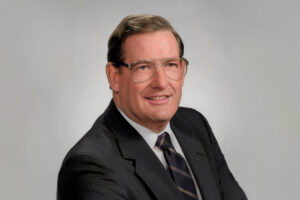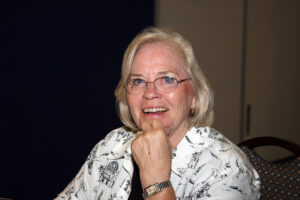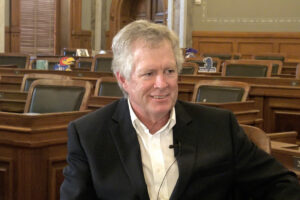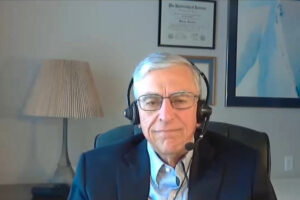Topic: Water Transfer Act

Interview of Carl Holmes, September 3, 2020
Interviewed by Rex Buchanan
In this 2020 oral history interview, former State Representative Carl Holmes discusses his observations of state water policy formulation in the 1970's through 2012. Holmes began his involvement in water policy as a farmer and active member of his community in southwest Kansas. In many respects, his experiences reflect the water-energy nexus. Holmes describes how he had observed cities and irrigators mining water in southwest Kansas. He recalls developing a comprehensive understanding of water issues by interviewing the managers of the state’s water resources. In this interview, Holmes describes how he managed the House Energy and Natural Resources Committee by Show Morecreating subcommittees and educating members on how to work bills and guide them through the process. He discusses his bipartisan work with Representative Ken Grotewiel and other committee Democrats in the 1990s, actions that resulted in the Speaker removing him from the chairmanship of the committee. Holmes describes how irrigation changed over time from flood to sprinklers and how the sprinkler systems have become more efficient. However, Holmes observed that groundwater levels continue to decline leading to abandoned wells, the growing of crops that require less water, the return to dryland farming, and, for some, the call for diversion of water from distant sources, such as the Missouri River, to sustain farming and communities on the plains. Show Less

Interview of Janis Lee, October 14, 2019
Interviewed by Joan Wagnon
Former State Senator Janis Lee's 2019 oral history interview covered her 22 years in the Kansas Senate as well as several years on the Kansas Court of Tax Appeals (formerly the Board of Tax Appeals and later returned to that name). The interview covers many topics, including how she campaigned in a rural district that increased in area over those 22 years, driving as much as 45,000 miles in an election year. Lee developed expertise in tax issues that was important to the agriculture community and in funding rural schools. Water supply was an important issue in her district, Show Moreas was adapting federal regulations so they would work in rural communities. She witnessed the shift to a more conservative legislature and more anti-abortion legislation. Funding for schools dominated most sessions.
Highlight -- short excerpt from the interview
Show Less
Interview of Dennis McKinney, August 23, 2019
Interviewed by Dale Goter
Dennis McKinney developed many insights in his sixteen years as a leader in the minority party into how the legislature did work, and how it should work. He recounts numerous instances when things worked well because of bipartisan cooperation and compromise. McKinney's experiences on the House Energy and Natural Resources committee working with Carl Holmes and Ken Grotewiel helped shape water policy in Kansas. His experience as a farmer and rancher in south central Kansas coupled with his focus on problem solving led to his reputation as a "middle of the road legislator" who would work Show Morewith both political sides as well as urban and rural. McKinney was committed to public education as well as conservation. The pursuit of fair and balanced tax policy shaped his actions. The interview highlights the importance of leadership from the governor's office and other legislative leaders (Mays, Shallenburger, D. Kerr, Morris). There is an interesting segment about the 2005 Special Session on school finance where McKinney talks about using the courts as leverage. The interview concludes with a brief discussion of the Greensburg tornado. Show Less

Interview of John Peck, February 5, 2021
Interviewed by Rex Buchanan
In this 2021 interview, John Peck, Emeritus professor of Law at the University of Kansas, recalls the early days of his career entering into the field of water law. His interview provides insight into the important elements of water law in Kansas and how they developed. Peck reflects on the effectiveness of Kansas laws and regulations governing water use. Peck also identifies continuing questions about existing water law and related practices. From his role as an active observer of the legal and regulatory culture that has developed around water in Kansas, Peck presents a unique perspective. Show More Show Less

Interview of Janis Lee and Laura McClure, May 20, 2024
Interviewed by Rex Buchanan
Janis Lee and Laura McClure, both Democrats elected from predominantly Republican districts that overlapped, often campaigned together and conducted constituent communication sessions in the areas they both represented. Because their time in the legislature (1989-2011) and their largely rural districts in northcentral Kansas intersected, Lee and McClure both worked on a wide range of policies pertinent to the Energy & Environment Collection of oral histories: confined feeding facilities, solid waste, waste tires, water quality standards, the Kansas v. Colorado lawsuit, and the Water Transfer Act that the city of Hays was exploring at the time of this interview, among Show Moreothers. In the energy arena, significant issues during their time of service in the Kansas Legislature included retail wheeling of electricity, gas pollution remediation, well plugging, and gas-gathering systems regulations. In this May 2024 interview, they explore those issues, the dynamics of the legislature, campaigning, and the work involved in serving in the legislature. Show Less
